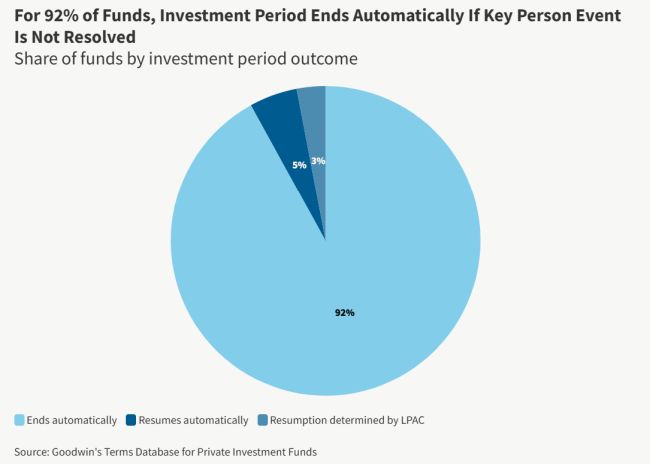- in South America
- in South America
- in South America
- with readers working within the Retail & Leisure industries
- within Transport topic(s)
Upon the occurrence of a key person event, a suspension period is typically triggered, during which the fund is not able to make new investments. In a previous article, we analyzed the average length of the suspension period and the ways they tend to vary among asset classes. In this article, we examine how fund sponsors resolve a key person event to terminate the suspension period and resume all investment activities.
A key person event occurs when a pre-determined number of critical investment executives are no longer involved with managing either the fund and/or the business of the manager. In almost all cases, resolving a key person event and thereby terminating the suspension period and reinstating the investment period involves seeking a vote from the limited partners or the limited partner advisory committee (LPAC) of the fund. In those instances, the general partner of the fund will typically notify all limited partners of the key person event, and the limited partners and/or the LPAC (depending on what is required in the fund's partnership agreement) will be given an opportunity to vote to terminate the suspension period and reinstate the investment period. If the suspension period is not terminated by the expiration date stipulated in the fund's partnership agreement, the investment period will typically automatically end on such expiration date.
A vote is not always needed to reach a resolution, however. Some fund sponsors, particularly those with significant negotiating power, can resolve a key person event by appointing a replacement for the key person who triggered the key person event (by failing to meet their devotion of time requirement or otherwise), and in such cases the appointment of the new key person will terminate the suspension period and reinstate the investment period.
Limited-Partner Approval Is Often Essential for Resolving Key Person Events
Among funds that use some form of voting mechanism to resolve the key person event, about 34% require the LPAC to vote, according to Goodwin's Terms Database for Private Investment Funds.
On the other hand, approximately 66% of such funds require the limited partners (rather than just the LPAC) to vote on the proposal to reinstate the investment period. The percentage in interest thresholds for limited-partner votes to approve the termination of a suspension period and reinstatement of the investment period typically fall into one of three categories, with the most common approach involving the approval of a majority of limited partners (by commitment).

Still, fund sponsors do not always need votes of approval from limited partners or the LPAC to resume investing. In rarer cases, a sponsor may be authorized to appoint a preapproved replacement. The approach will ultimately depend on the relative negotiating strength of the manager and/or the presence at the outset of an identifiable preapproved replacement. When there are classes of key persons, some sponsors may be able to negotiate a lower limited-partner-approval threshold to replace a more junior key person and a higher threshold for more senior members of the team.
What Happens If the Key Person Event Is Not Resolved?
Key person events usually trigger automatic suspensions of the investment period that, in most cases, last three to nine months. During this time, the sponsor will seek a resolution with the limited partners. However, if the sponsor is unable to resolve the key person event, either through limited-partner or LPAC approval or appointing a replacement, the fund's ability to make new investments will typically end automatically.
For an unresolved key person event, 92% of funds face an automatic termination of their investment period, according to Goodwin's Terms Database for Private Investment Funds. Upon such termination, the fund is typically still permitted to make follow-on investments in existing investments, manage existing investments, and pay fund expenses. The fund will be prohibited from making new investments, and the sponsor may face difficulties in raising a successor fund.

Our database shows that in rare cases (approximately 5%), instead of automatically terminating the investment period if no resolution is found by the end of the maximum suspension period, the investment period will resume automatically. An even smaller number of funds (3%) refer the outcome of whether the investment period terminates or reopens to the LPAC, although if LPAC approval was not previously obtained to terminate the suspension period, it is unlikely the LPAC would then approve a reopening of the investment period upon the expiration of the suspension period.
Key person event provisions do not vary significantly among asset classes. Instead, differences are more likely to reflect the specific structure of a sponsor's business and their relative negotiating position, especially with respect to the percentage threshold required to approve the termination of a suspension period and whether the voting mechanism requires LPAC (instead of limited-partner) approval.
* * *
This article is part of our ongoing Fund Terms Intelligence series wherein Goodwin provides market commentary and benchmarking on key fund terms of interest to fund managers and investors, brought to light by sharing relevant extracts of our terms database. Connect with us to discuss your specific situation.
The content of this article is intended to provide a general guide to the subject matter. Specialist advice should be sought about your specific circumstances.





